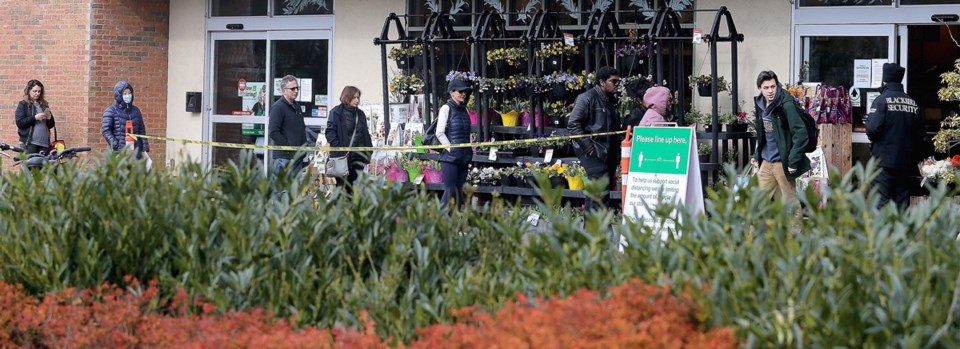Supermarkets are being swamped with delivery requests, leaving shoppers — some of them in vulnerable health — forced to pick up supplies in person or scramble to find someone to go out on their behalf.
Demand for grocery store products has spiked amid fears around COVID-19 as shoppers locally and around the world rush to stock up.
Obtaining day-to-day supplies is impossible sometimes because certain products — such as flour and toilet paper — are snapped up quickly.
Stores are responding by limiting purchases of certain items.
They are also restricting the number of customers permitted indoors to make it easier for people to respect the two-metre physical distance recommendation.
Lineups at store entrances are now a common sight, as are security personnel.
Special in-store shopping times for seniors and vulnerable citizens have been introduced.
All this demand for products and fear of picking up the virus from others has overwhelmed online delivery and pick-up services.
Customers say some busy websites won’t let them sign on while others do not have timely, or any dates, available.
Victoria’s Ute Mannhardt is appealing to fellow citizens who are able to shop to avoid delivery in order to make it available for seniors, those with medical conditions, and health care workers.
It’s the right thing to do, she said. She is echoing what many supermarket companies are saying.
“It really is a service that should be there for the most vulnerable,” Mannhardt said. “We all have a moral obligation to look after everybody.”
Mannhardt illustrates the problem by pointing to a friend who is nearly 80 years old and was unable to get at-home delivery.
“It’s just so backlogged that she can’t order. She really shouldn’t be going out. …Today, she had her cleaning lady bring her food.”
John Kell, 73, has a heart condition and has given up on delivery after a frustrating time attempting to order from several supermarkets this week. He’s planning to make an in-person trip to a local store.
Brian Cameron, another Victoria resident, is calling on the federal government to use the military to get food to people who are at risk. He suggests taking seats out of troop-carrier trucks to leave room for groceries.
“We have a navy base at Esquimalt, also a military reserve. Why are these military personnel not being tasked with helping the community during these times? Are we not at war against this major health threat?”
Cameron, 63, said he has non-Hodgkin lymphoma, chronic sinusitis and chronic bronchitis. “I cannot afford to get COVID-19.”
After two weeks of trying, he finally received a March 31 date for grocery delivery, he said.
Cameron went to a supermarket during the designated time for seniors and vulnerable citizens and asked staff why the website wasn’t working. He said he was told the website was swamped and there is a shortage of delivery drivers.
Stores are acknowledging the problems and some offer suggestions on their websites.
Thrifty Foods suggests customers go online between 8 p.m. and 4 a.m. for better online results.
“Due to the high volume of orders we are receiving, time slots [for delivery] are filling up quickly. … We are currently experiencing a higher volume of transactions which may cause some performance issues.”
The store cautions that there might be delays in delivery or pickup times that customers select and reservations for those services must be made 24 hours in advance. Also, delivery staff will not enter a home.
At Save-On-Foods, the company has increased its fleet of delivery vehicles because of the demand.
“Customers who can shop in store are encouraged to do so in order to leave the delivery option available for those who aren’t able to get to the store, including seniors, people with disabilities, and those with the novel coronavirus.”
Instacart, a California-based company that delivers groceries in cities, including Victoria, in 11 of Canada’s provinces and territories, has seen order volume grow more than 150 per cent over the past several weeks, the company said in an email.
“In the last few weeks, we’ve seen unprecedented customer demand across our platform,” it said, noting the average customer order size is up more than 15 per cent month over month.
Delivery windows vary based on retailers, the number of available shoppers and other factors, it said. Instacart encouraged customers to check for delivery times online frequently.
— With files from The Canadian Press



